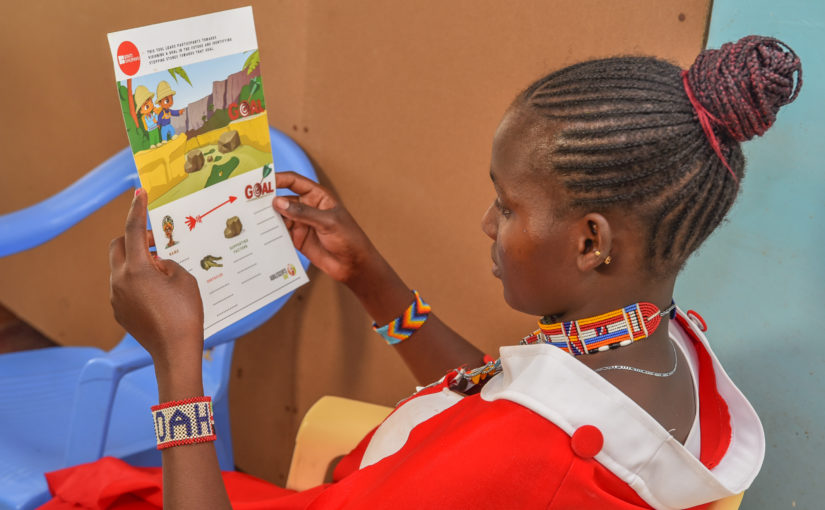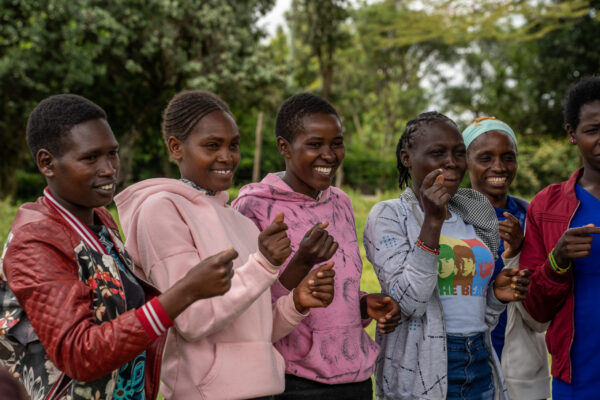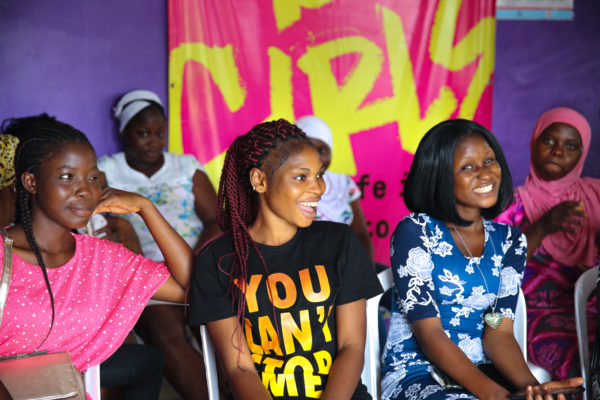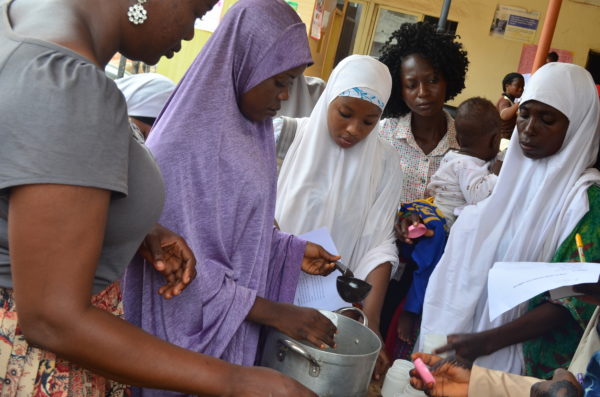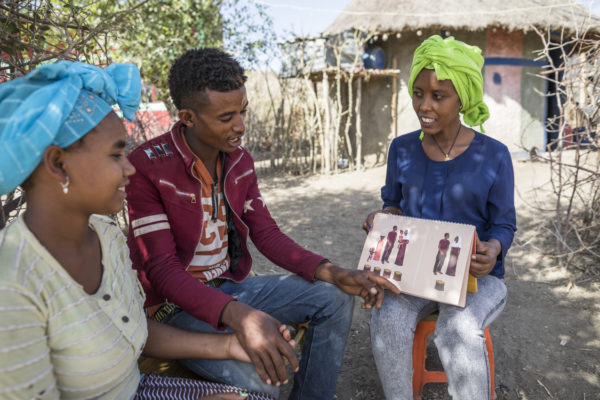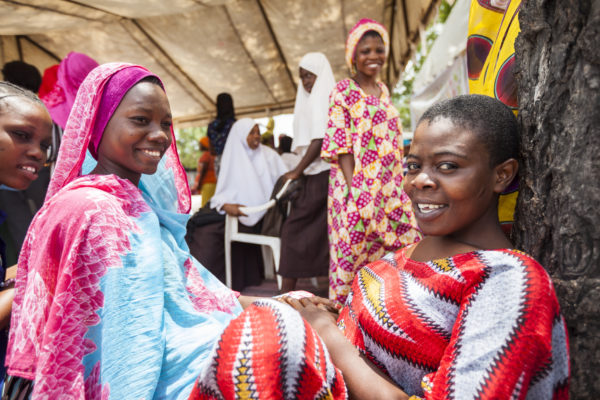Designing with a Multidisciplinary Approach
Adolescents and technical experts together designed Kuwa Mjanja, A360’s girl-centered program in Tanzania. Kuwa Mjanja worked to normalize the contraceptive conversation and reduce the stigma facing adolescent girls seeking care. A360 used a multi-disciplinary approach, bringing together a consortium of experts from a variety of disciplines including Human Centered Design (HCD), public health, development neuroscience, sociocultural anthropology, meaningful adolescent and youth engagement (MAYE) and social marketing to design solutions that challenge the status quo and are meaningfully rooted in girls’ experiences and perspectives.
It was through this approach that Kuwa Mjanja was able to identify and lead with girls’ priorities—making money, managing growing responsibilities, navigating the transition to adulthood, and for many, embracing the joys of motherhood—to position contraception as a tool to achieve their dreams.
The aspirational messaging developed through this multidisciplinary process alongside other program components such as ASRH counselling and services reinforced girls’ pride in developing and pursuing life goals. And through a combination of facility and community-based events, Kuwa Mjanja supported girls to build confidence and bodily autonomy while accessing youth-friendly services in a safe and stigma-free environment.
By applying this multidisciplinary approach to designing adolescent health solutions, adolescents and technical experts were able to work together to ensure Binti Shupavu was identifying and leading with what girls say they want, and need. Binti Shupavu supports adolescent girls, their families and their community to see the role access to contraception can play in helping girls to achieve their dreams.
Binti Shupavu Clinic events are the entry point for adolescent girls – offering them a safe space to interact with the health provider, connect with their peers, learn about contraception and share their own stories of growth. Binti Shupavu Stories sessions engage and educate community influencers and those closest to young women, like their mother or husband, to address SRH misinformation and encourage their support and understanding for the decisions girls make about their bodies and futures. And through Binti Shupavu’s Community Fest, young women gain mentors and role models who support them in developing new skills and financial security – enabling them to feel confident in using their voice to secure their future.
Putting Youth at the Center
Kuwa Mjanja’s adaptive implementation offers a prime example of the use of data to support rapid course-correction. The team used to understand not only quantitative performance, but also the experiences of girls, providers, health system partner, and mobilizers during Kuwa Mjanja events, thereby helping the project team to recognize what adaptations would be beneficial.
Adolescents’ experiences, expectations, needs and priories are far from homogenous –and all of these unique perspectives are necessary to ensuring the project remains relevant to what girls say they want and need. When we first started, we heard that girls felt judged when seeking SRH services and many of them did not understand their body’s changes throughout menarche. Some girls did not feel that contraception was for them while others only heard about contraception after having their first child.
These types of insights were vital in ensuring the project remained relevant to what girls say they want and need — and couldn’t have happened without MAYE. Meaningful and deep partnership with young people opens up tremendous opportunities for insights and innovation – reinforcing the importance of MAYE within the ASRH sector.
A360 also recruited and trained a group of young professionals who were seconded to field teams in each of Kuwa Mjanja’s regions. As part of A360’s commitment to MAYE, these young professionals assisted with:
- Observing event flow, supplying consistency at times of staff transitions to maintain fidelity to the Kuwa Mjanja model and principles.
- Identifying areas for project improvement, making recommendations and innovating to problem solve.
- Testing adaptations to increase the efficiency of implementation of high-volume events.
Binti Shupavu was designed with the diverse developmental experiences of adolescents in mind.
By bringing adolescent girls into the design process, we learned that adolescent girls saw value in learning about contraception from trusted sources in their communities like their spouses, mothers and health workers—and yet due to misinformation, a lack of information and rampant stigma, adolescent girls may find it difficult to access SRH services.
In both Tanzania and Kenya, A360 has been committed to MAYE —working to create a favorable environment where young people are included and respected and their contributions, ideas, perspectives, skills and strengths are integrated into the design and delivery of programs.
The youth innovation officers in Kenya were central in the co-development of the Binti Shupavu program, guided by the A360 MAYE strategy framework. This framework seeks to mainstream adolescent and youth engagement across the program, and build the capacity for adolescents and youth to pro-actively engage and their voices, ideas and creativity to be amplified.
Supporting Girls to Achieve their Goals
A key component of Kuwa Mjanja’s approach is the entrepreneurial skills’ demonstration component, offering girls a chance to attend programming – without fear of stigma.
Not only was this a motivating factor for girls to attend Kuwa Mjanja events, it was also often the main reason that many parents, community leaders, government officials and other key stakeholders supported the project. Girls and their influencers saw the chance to learn a (marketable) skill as valuable in a context where skills are often hard for girls to acquire, but critical in their ability to secure a stable future. And while the girls develop new skills and financial security, they also build confidence that enables them to use their voice to make their own choices about their future. The strong stakeholder support for incorporating vocational skills-building into ASRH programming offered Kuwa Mjanja the chance to navigate a sensitive ASRH ideological landscape while increasing access to much needed SRH services for adolescent girls.
Binti Shupavu sought to replicate the stigma-free, youth-friendly environment for adolescents accessing SRH services. As such, Binti Shupavu Community Fest’s offer adolescent girls the opportunity to learn about contraception while also building relevant skills they can use to pursue their goals.
These events provide training on skills such as dressmaking and hair styling to support girls to begin planning for their future families and finances. And while they develop new skills, they are provided accurate and reliable information on contraception from trained health workers. By securing support from the entire community, Binti Shupavu provides a safe space for adolescents to navigate misconceptions and avoid stigma around SRH services while building the confidence and skills they need to make choices about the life, and family, they want.
As we look ahead to our work in Kenya, we have an exciting opportunity to better understand – and increase – the true impact of our interventions.
Girls need all of us to get there. As we adapt and replicate our programming, we’ll continue sharing what we learn about what it takes to deliver programming at scale.
Together, we can support even more adolescent girls with the tools they need to reach their goals and achieve their dreams.

